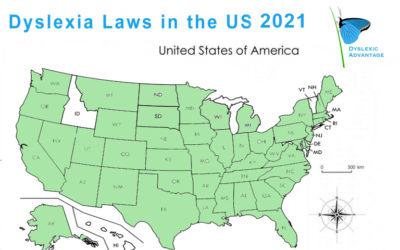The Department of Justice has also released video clarification of key rights for students regarding testing accommodations under the ADA or Americans with Disabilities Act. The entire video is located at the bottom of this post, but we are highlighting a section...
Dyslexia | Environmental Law Pioneer David Schoenbrod
David Schoenbrod is a pioneering environmental attorney on faculty at New York Law School. Since his start in doing anti-poverty community development under a program initiated by Bobbie Kennedy, he has used out-of-the-box dyslexic big picture thinking to trigger a...
Executive Function: What Smart People Do Differently While Learning [Premium]
When researchers compared high IQ and average test subjects in a learning paradigm, the results were surprising. In some areas high IQ individuals work less, as might be expected by the idea that higher IQ people have more efficient brains for learning tasks, but in other areas, high IQ brains were working harder. When were high IQ brains working harder? Not prior or during the task, it seems, but when feedback was given and individuals were learning from their mistakes. From Graham et al. : “the Average IQ group failed to produce as much activation during feedback evaluation as did the High IQ group. These group differences are inconsistent with the neural efficiency hypothesis and instead suggest that the High IQ individuals were engaged in […]
How Dyslexia Changes at Different Ages [Premium]
With all of the advances in our understanding of early intervention, dyslexia in older students and young adults often gets short shrift. The paper by Dr. Kathleen Niesen and colleagues has some interesting findings that have important points for identification, accommodations, and understanding of both the challenges and strengths of adolescents and young adults with dyslexia. Importantly, the authors made this point: “…if dyslexia was not diagnosed earlier in schooling, young adults do not qualify for accommodations even if as adolescents and adults they meet research criteria for dyslexia on evidence-based assessment. Such assessment practices do not seem fair or sensible or consistent with the spirit of the Americas for Disabilities legislation.” The point made was that dyslexia missed in the early grades usually meant dyslexia […]
STRENGTHS MATTER: Intelligence and Dyslexia [Premium]
Parents and dyslexia advocates should beware – there are vocal proponents arguing against the importance of intelligence and / IQ in determining the educational needs of students with dyslexia. As far as it seems we have come with dyslexia (more states with dyslexia-specific laws, mandatory teacher training), there are areas where the concept of specific learning disability and the definition of dyslexia is coming under attack. SOME “EXPERTS” BELIEVE INTELLIGENCE IS IRRELEVANT FOR EDUCATING DYSLEXIC STUDENTS As surprising as it may seem, Past IDA Vice President Dr. Louisa Moats has argued through questionable selection of data there are “negligible cognitive differences between ‘LD’ and ‘Poor Reader’ ” groups. From her presentation online HERE, she states “Garden variety poor readers” are numerous and very much like […]
Breaking Research : Dyslexia in Adolescents and Adults [Premium]
An important paper was published this month from the University of Washington, entitled “Evidence-Based Reading and Writing Assessment for Dyslexia in Adolescents and Young Adults.” The paper is especially important guiding testing professionals who assess teens and adults for dyslexia or see gifted or twice-exceptional students. This paper also takes a more systematic look at the roles of individual factors like working memory and executive function on dyslexia and reading and spelling performance. The data will be helpful in targeting educational interventions and can also guide requests for testing accommodations. There are interesting observations too in that paper that will help with characterizing the strengths that occur among adolescent and adult dyslexics, with implications for twice-exceptional or gifted students with dyslexia. In several areas, adolescent / adult […]
How to Help a Dyslexic Student in a General Education Classroom
From the Connecticut Longitudinal Study, up to 1 in 6 students are dyslexic, but only a minority of these students will be found in special education classrooms. What does this mean for regular classroom teachers? 1. Get Basic Facts about Dyslexia - Dyslexic students...
Dyslexia Laws 2021
Here's our 2021 snapshot of Passed Dyslexia Laws in the US. This is a rapidly changing time for dyslexia legislation, so please update us with corrections, changes, or newly passed laws. Huge thanks to the Dyslexic Advantage community, Decoding Dyslexia, and other...
Doing Math : Inchworms vs. Grasshoppers [Premium]
‘If a child does not learn the way you teach then teach him the way he learns.’ Two American school teachers noticed that their students tended to prefer one of the two ways their teachers explained math. The inchworm style was part-to-whole, dutifully performing incremental step-by-step pencil work, following the solving of math problems more like a recipe than an intuitive leap. The grasshopper, on the other hand, was the big picture leaper, more likely to subtitute numbers (rounding up or down), use mental math strategies, working backwards from an example solved question. What strategy to most dyslexic students prefer? The answer seems to vary. In UK research (Chinn et al., 2001), dyslexic inchworms seemed to outnumber grasshoppers, but Miles and Miles (also in the […]
Your Brain on Math Anxiety [Premium]
This is your brain with math anxiety. In children as young as 7 years old, researchers found that activation in areas such as the amygdala and hippocampus were seen in children who had high math anxiety. The amydala and hippocampus are areas of the brain associated with fear condition and negative emotions. The children were given simple and complex arithmetic problems and asked to determine whether the answers given were right or wrong. The children in the high and low anxiety group were matched for IQ, working memory, reading and math performance, and general trait anxiety. As a double burden, the high math anxiety group (HMA) in the figure showed lower brain fMRI activation in areas associated with math processing. So anxiety could be acting […]
What is Dyscalculia? – Fast Facts [Premium]
“There is nothing in the IDEA that would prohibit the use of the terms dyslexia, dyscalculia, and dysgraphia in IDEA evaluation, eligibility determinations, or IEP documents.” – Michael Yudin, Department of Education “Dyscalculia is not assessed in our schools.” – school professional Fast Facts about Dyscalculia What Is Dyscalculia? Dyscalculia is usually defined as a difficulty with calculations or arithmetic skills that is not explained by low intelligence or inadequate schooling. How Common? 3-10% of people, 40% of dyslexics What Ages? Dyscalculia is lifelong, although many helpful strategies can improve math achievement. When adults with dyscalculia have calculator accommodations, they can perform at high levels in even mathematics-intense disciplines. From We Are Teachers How Do You Assess Dyscalculia? Typically dyscalculia is assessed by calculating the […]
[PREMIUM] Tips for Listening in Foreign Language Classrooms
Although for some dyslexic students the listening component of foreign language classes is an area of strength, many have significant challenges that teachers should be aware of in order to have a successful year. MULTISENSORY AND EXPLICIT INSTRUCTION TO HELP WITH AUDITORY DISCRIMINATION Dyslexic students can have significant challenges in the auditory discrimination of quick sounds, making the accurate learning of new words especially difficult. Teach sounds in a multisensory way, using pictures and actions and also exaggerating tricky or quick sounds and clapping out syllables so no parts of words will be skipped. Some students may need to have explicit instruction in how certain sounds are generated. Working with a mirror and receiving feedback about correct mouth and tongue positions while saying certain words […]



![Executive Function: What Smart People Do Differently While Learning [Premium]](https://www.dyslexicadvantage.org/wp-content/uploads/2016/06/woman-thinking-our-shutterstock.jpg)
![STRENGTHS MATTER: Intelligence and Dyslexia [Premium]](https://www.dyslexicadvantage.org/wp-content/uploads/2019/08/annie-spratt-OyJweKTYGbs-unsplash.jpg)
![Breaking Research : Dyslexia in Adolescents and Adults [Premium]](https://www.dyslexicadvantage.org/wp-content/uploads/2016/02/Screen-Shot-2019-10-08-at-4.23.50-PM.jpg)


![Doing Math : Inchworms vs. Grasshoppers [Premium]](https://www.dyslexicadvantage.org/wp-content/uploads/2016/03/maths-our-shutterstock-scaled.jpg)
![Your Brain on Math Anxiety [Premium]](https://www.dyslexicadvantage.org/wp-content/uploads/2016/02/shutterstock_331750409.jpg)
![What is Dyscalculia? – Fast Facts [Premium]](https://www.dyslexicadvantage.org/wp-content/uploads/2016/02/shutterstock_172115972-math.jpg)
![[PREMIUM] Tips for Listening in Foreign Language Classrooms](https://www.dyslexicadvantage.org/wp-content/uploads/2019/01/foregin2.jpg)













